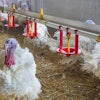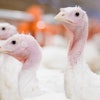The National Turkey Federation can't help but admire the delicate political and scientific calculus that clearly went into the preparation of the three antibiotic-related documents released mid-April by the FDA’s Center for Veterinary Medicine. The document attempts to walk the fine line between responding to public criticism of antibiotic use in food-producing animals while preserving the use of important antibiotics needed to treat and prevent diseases in turkeys and other farm animals.
The Center for Veterinary Medicine’s solution is to try to transition many of those drugs from uses some deem sub-therapeutic to a preventative use any rational person would consider therapeutic.
Science-based response important
FDA should be commended for resisting emotional calls for a widespread ban on antibiotic use in farm animals. Despite claims from activists, the media, Congress and even some within FDA itself, there is not scientific consensus that antibiotic use in food-producing animals creates resistance in pathogens that then is transferred to humans – ultimately reducing the effectiveness of antibiotics in treating human diseases. By changing the label claims for some antibiotics (and possibly their conditions of use) and increasing veterinary oversight of the drugs' use, the center’s leaders hope to begin resolving the resistance debate while creating a scientifically valid, fair mechanism for reviewing and preserving all animal drugs used for treatment, control and prevention.
Several legislators, including Rep. Louise Slaughter, D-N.Y., have raised concern in recent years about antibiotic use in animal agriculture. Her efforts are driven in part by activist groups, and the criticism often is repeated without challenge in the media.
Animal agriculture industry called to action
Collectively, all of animal agriculture must effectively communicate to legislators, its customers and ultimately the consumer that antibiotics and other animal drugs have been safely used on farms for more than half a century to treat and control disease in animals and to improve the animal’s overall health. The use of antibiotics helps maintain a food supply that is affordable to Americans of all income levels and can be an important tool in making animal products more healthful and safer for human consumption. Antibiotics also can prevent and alleviate animal suffering.
Of course, the issue of antibiotic use in animals affecting human health is also being challenged. It is important those in the animal agriculture industry convey that the issue has been researched for more than 30 years. Two scientific bodies (National Research Council and World Health Organization) have concluded that the use of antibiotics on farm is not an imminent public health threat and that additional research is needed before final regulatory action is taken.
The number-one priority for turkey farmers is the health and well-being of their flocks so they can continue to provide consumers with safe, wholesome and affordable turkey products. Therefore, during National Turkey Federation’s 2012 Leadership Conference, July 8-10, in Washington, D.C., the turkey industry will raise the issue of antibiotic use in animal agriculture with their elected officials.


















